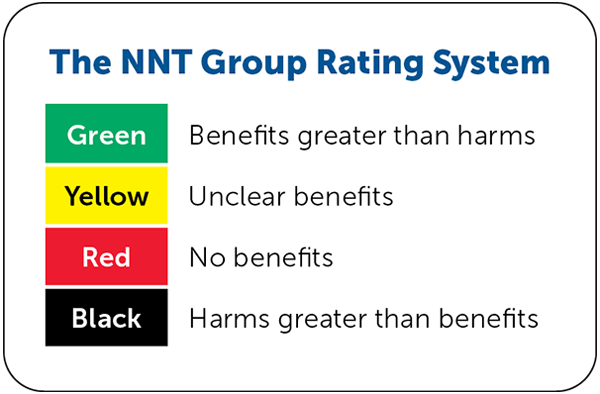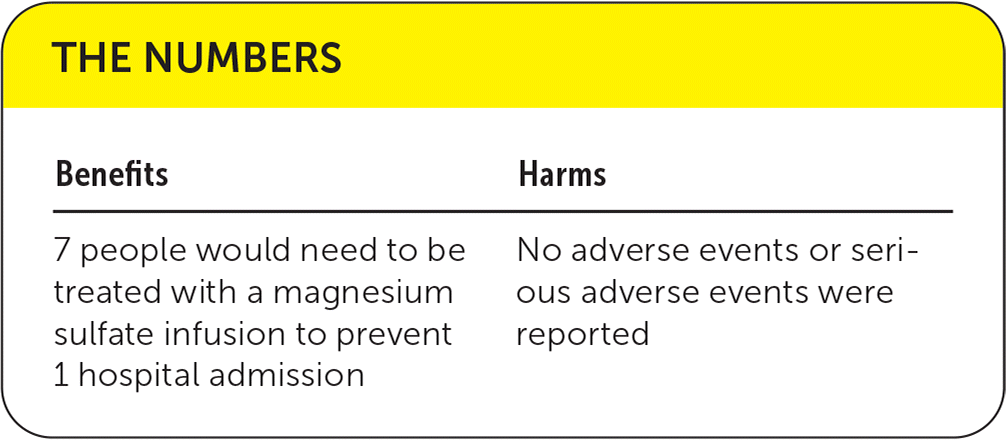
Am Fam Physician. 2022;106(5):online
Author disclosure: No relevant financial relationships.

Details for This Review
Study Population: Adults 35 years and older in seven countries presenting to an emergency department (ED) with an acute exacerbation of chronic obstructive pulmonary disease (COPD)
Efficacy End Points: Hospital admissions from the ED and the need for noninvasive ventilation, assisted ventilation, or intensive care unit admission
Harm End Points: Adverse events or serious adverse events
Narrative: COPD is a chronic, progressive disease often complicated by exacerbations that commonly lead to hospital admissions, decreased quality of life, and increased morbidity and mortality. Novel strategies have been suggested to decrease the rate of hospitalizations for acute COPD exacerbations.
Some evidence suggests that hypomagnesemia increases airway hyperreactivity, impairs pulmonary function, and increases the risk of COPD exacerbations.1,2 A 2008 study showed that hypomagnesemia is an independent predictor of readmission to the hospital for acute COPD exacerbations.3 Magnesium sulfate infusions are used as adjuvant therapy for asthma exacerbations because of their bronchodilatory effect.4 Similarly, magnesium sulfate may have potential as adjuvant therapy for COPD exacerbations.
A 2022 Cochrane review evaluated magnesium sulfate in the management of acute COPD exacerbations in the ED. This review included 11 randomized controlled trials (10 double-blind and one single-blind), with 762 participants in seven countries (United States, Iran, Turkey, Nepal, New Zealand, United Kingdom, Tunisia).5 The primary outcomes were hospital admissions and the need for noninvasive ventilation, assisted ventilation, or intensive care unit admission.
Seven of the studies examined magnesium sulfate infusions, three studies assessed nebulized magnesium sulfate inhalation, and one study examined both. Comparisons included placebo alone (five studies), placebo plus standard care (three studies), placebo plus alternative nebulized solution (two studies), and nebulized ipratropium plus intravenous saline (one study).

| Benefits | Harms |
|---|---|
| 7 people would need to be treated with a magnesium sulfate infusion to prevent 1 hospital admission | No adverse events or serious adverse events were reported |
Three of the studies in the Cochrane review evaluated hospital admissions from the ED. These studies included 170 patients from the United States, Iran, and New Zealand. Low-certainty evidence suggested a reduction in hospitalizations with magnesium sulfate infusion compared with placebo (odds ratio = 0.45; 95% CI, 0.23 to 0.88; number needed to treat = 7).6–8 A number needed to harm could not be calculated because no adverse events were noted in these studies. The analysis found no significant difference in hospital admissions with nebulized magnesium sulfate compared with placebo, standard care, or nebulized ipratropium. The analysis did not demonstrate a statistical difference for the other primary outcomes.
Caveats: The meta-analysis had a small sample size of 762 people. Of the 11 studies included, five were considered to be at low risk of bias, and six were considered to be of unclear bias. Each study had a small number of participants. Of the studies that examined magnesium sulfate infusion for the treatment of acute COPD exacerbation in the ED, only one reported adverse events.8
None of the studies quantified COPD severity, making it difficult to know if comparison groups were similar. Despite previous data showing a correlation between low magnesium levels and hospital readmission, none of the three studies evaluating hospital admissions from the ED reported magnesium levels on initial presentation to the ED; therefore, it is difficult to determine if patients who benefited from magnesium sulfate infusion were truly hypomagnesemic at the time of initial presentation.
Conclusion: A color recommendation of yellow (unclear benefits) was assigned for the use of magnesium sulfate infusion to prevent hospital admission from the ED for acute COPD exacerbation. However, more extensive studies are needed, as well as additional data on adverse events and serious adverse events. Safety data, inclusion criteria (including consideration of hypomagnesemia), and dosing guidance are required before magnesium sulfate infusions are a routine addition to the standard of care for patients with acute COPD exacerbations.
The opinions and assertions contained herein are the private views of the authors and are not to be construed as official or as reflecting the views of the U.S. Department of Defense or the U.S. Air Force.
